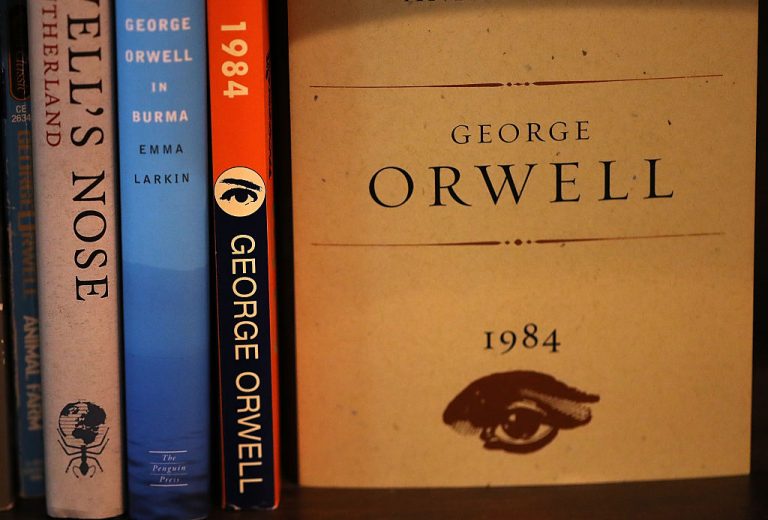In a recent BBC Panorama program, President Brad Smith of Microsoft warned that artificial intelligence (AI) poses a threat to human beings. He said that if countries do not pass laws to protect the public, technology may race ahead, and “it’s going to be very difficult to catch up.”
“I’m constantly reminded of George Orwell’s lessons in his book 1984. You know the fundamental story… was about a government who could see everything that everyone did and hear everything that everyone said all the time,” Smith said on the show.
The BBC program explored China’s increasing prowess in AI, including its advancements in monitoring people. The situation in mainland China is perhaps the closest to a 1984 scenario the world has ever seen.
- In 2018, China blocked 17.5 million flight ticket sales and 5.5 million train ticket sales to people who were blacklisted on the country’s infamous Social Credit System. The Chinese Communist Party’s (CCP) Social Credit System ranks citizens based on a wide range of criteria, including daily behavior, the people they associate with, their online purchases, and so on. Based on the scores, citizens are rewarded or punished.
- A November 2019 exposé by the International Consortium of Investigative Journalists (ICIJ) stated that Chinese police were using a “data collection and analysis system that uses artificial intelligence to select entire categories of Xinjiang residents for detention.” One document that ICIJ received detailed a behavior modification points system for detainees at internment camps, used for administering rewards and punishments.
- A recent study by Comparitech showed that there are 770 million surveillance cameras in use globally, with 54 percent of them located within China. Except for the four cities of London, Hyderabad, Indore, and Delhi, 16 of the 20 most surveilled cities in the world are in China.
- A BBC report exposed a Chinese initiative that uses AI and facial recognition to identify an individual’s emotional state of mind. The system has been tested on the Uyghur minority in Xinjiang and displays a person’s mental state on a pie chart.
In an interview with The Epoch Times, Dr. Robert J. Bunker, adjunct research professor at the Strategic Studies Institute at U.S. Army War College, said that the Social Credit System was “far more insidious” than Orwell’s 1984 because it represents “a massive social engineering program—one that will increasingly be [driven by] facial recognition technology and artificial intelligence.”
In 2018, a student from Zhejiang Province had his enrollment offer from a university suspended due to his father’s low Social Credit System score. The father’s score had declined because he was unable to repay 200,000 yuan in bank debt.
US-China AI conflict
Success
You are now signed up for our newsletter
Success
Check your email to complete sign up
BBC Panorama also highlighted the AI arms race between the United States and China. In November last year, Li Yuxiao, deputy head of the Chinese Academy of Cyberspace Studies, claimed that China had filed 110,000 AI patent applications in 2019, outpacing the United States as the global leader for the first time.
Eric Schmidt, former Google chief executive and current chair of the US National Security Commission on Artificial Intelligence, stated that democracies need to win the AI battle or “we’ll be looking at a future where other values will be imposed on us.”
In addition, Seth Moulton, Chair of the US Future of Defence Task Force, asked American companies to support the Defense Department. “Are you going to help us win this race or are you going to essentially be against us? China does not have the same system of government as we do… Could the AI arms race lead to conflict with China? Absolutely,” he said in the program.
On Mar. 5, 2021, China’s national congress reviewed the country’s Five Year Plan ending in 2025. The communist regime pledged to make “science and technology a strategic pillar for national development,” reported The Epoch Times.
Seven areas were classified as essential to “national security and overall development,” including artificial intelligence. In an interview with Wall Street Journal, Alex Capri, a senior fellow at the National University of Singapore’s business school, said that “leading in AI and computing enables China to reap huge benefits in hybrid warfare and intelligence gathering.”
On Mar. 1, the U.S. National Security Commission on Artificial Intelligence (NSCAI) released a 750-page report to Congress, warning that China would likely surpass America within the next decade in the field of AI.
“The United States should invest what it takes to maintain its innovation leadership, to responsibly use AI to defend free people and free societies, and to advance the frontiers of science for the benefit of all humanity. AI is going to reorganize the world. America must lead the charge,” the report said.
With reporting by Prakash Gogoi.
















